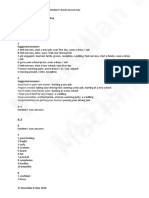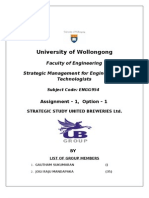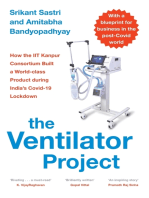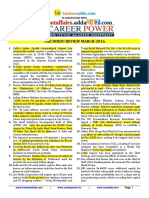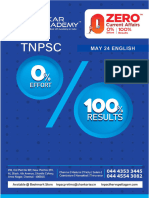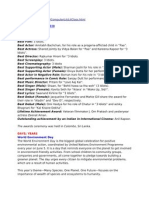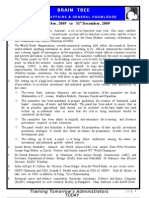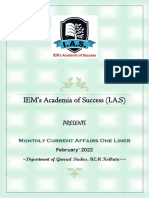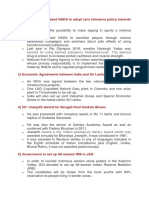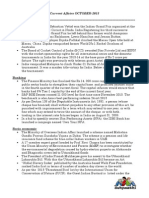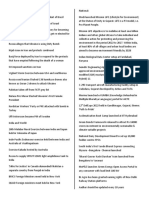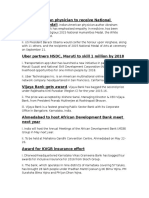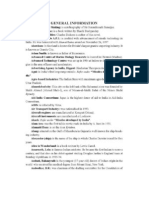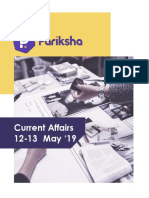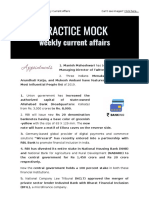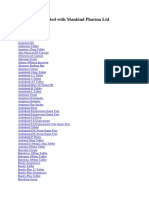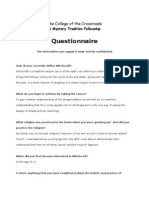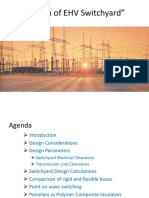Business News - May 2010: Expedition
Business News - May 2010: Expedition
Uploaded by
sandeep0109Original Description:
Original Title
Copyright
Available Formats
Share this document
Did you find this document useful?
Is this content inappropriate?
Report this DocumentCopyright:
Available Formats
Business News - May 2010: Expedition
Business News - May 2010: Expedition
Uploaded by
sandeep0109Copyright:
Available Formats
BUSINESS NEWS - MAY 2010
With effect from the close of trading on May 26, 2010, India became weightier on the MSCI Emerging Markets (EM) Index, one of the most widely used benchmarks for institutional and retail funds worldwide. This was followed by Israels exit from the Index and entry into the MSCI World Index, comprising developed markets. Leading index builder MSCI Barra decided to redistribute the weight of Israel among the other 21 countries on the EM Index, including India, instead of adding another country. India has consequently seen an uptick in its weight on the Index, although slight, going to 7.9 per cent from 7.7 per cent. China, the dominant presence on the EM Index, saw its weight go up nearly a per cent, from 17.4 per cent to 18.3 per cent. Bank of Rajasthan has been merged with ICICI Bank. Mother Dairy, one of the largest milk processors in India, plans to roll out its exclusive retail outlets Gaurav Stores to market the entire range of Mother Dairy products across India. Japanese car-maker Nissan has started the commercial production of its small car, Micra, from its Chennai plant which it plans to make a global export hub. Automobile major Mahindra & Mahindra (M&M) has acquired a majority stake in the Reva Electric Car Company Ltd of Bangalore. As a result, Reva Electric Car Co Ltd. will be renamed as Mahindra Reva Electric Vehicle Co Ltd. Under the agreement, M&M will own 55.2% equity in the new company by a combination of equity purchase from the promoters and a fresh equity infusion of over Rs 45 crore into the company. The buyout makes the Mahindra group a strong global player in the electric vehicle space. Market regulator the Securities and Exchange Board of India (SEBI) has said that starting June 1, 2010, mutual fund distributors and agents will need a National Institute of Securities Market (NISM) certificate to sell policies. C.S. Verma has taken over as Chairman of SAIL, the biggest State-owned steel producer of India. US-pharma major Abbott has acquired Piramal Healthcare for $3.72 billion (About Rs 18,000 crore) to become the largest drug manufacturer in India. The Hinduja group has announced its decision to acquire European private bank KBL epb for euro 1.35 billion (about Rs 8,770 crore). KBL epb is a subsidiary of Belgium-based KBC group and is one of the largest onshore private banking groups with affiliated local banks in 55 locations across 10 European countries
the easy manoeuvring of LCH even with weapons.
The other interesting feature of the LCH is the chin-mounted canon along with the helmet m
the pilot the capability to look and fire at targets around the aircraft. An advanced sensor su
looking infra-red imaging technology and laser range finder facilitates target acquisition in a
The helicopter would be fitted with a data link for network-centric operations facilitating the airborne platforms and ground stations operating in the network, thus facilitating the force
With these features, the LCH is expected to play a major role in air defence against slow mo
enemy air defence operations, escort to special heli-borne operations, support of combat se role and scout duties.
EXPEDITION First Indian to sail solo around the world
On May 22, 2010, Commander Dilip Donde of the Indian Navy became the first Indian ever
sail-boat when he steered into the Mumbai harbour after his arduous effort spanning a little
Commander Dilip Donde, who started the voyage on August 19 2009 on INSV Mhadei, touc
Light House in Mumbai. His boat was ceremonially escorted by a fast attack craft of the Ind tugs operating their water cannons. Vice-President Hamid Ansari, along with Chief of Naval
Dondes family members, who were on board INS Delhi, anchored at the finish line, witness rousing reception.
The 56-foot-long Mhadei, with 23-tonne displacement, is the first fibreglass yacht construct
of-the-art navigation and communication equipment. The 276-day voyage was part of the N which aims to revive the old tradition of sea faring.
CURRENT GENERAL KNOWLEDGE: MAY 2010
AWARDS National Technology Award, 2010
The 42-year-old officer covered 21,600 nautical miles sailing in the seas to achieve the mile Ocean, the Atlantic Ocean and the Arabian Sea. He also sailed along the Equator. He made
Fremantle-Australia, Christchurch-New Zealand, Port Stanley-Falkland Islands and Cape To
the expedition legendary A pioneer in processing rice bran oil, A.R. Sharma, who comes from dusty town of Dhuri in Sangrur district, has beenwith honoured with Sir Robin Knox-Johnston, the first man to sail solo and non-s the national award by the Technology Development Board of the Ministry of Science and Technology. Former President Dr A.P.J. Abdul Kalam presented the awardRs 10 lakh and a trophyto him.
The world record for the fastest solo circumnavigation was set in January 2008 by Frenchm 34 minutes and 6 seconds.
Sharma is the chairman-cum-managing director of the A.P. Organics (P) Ltd, a part of Rs 500-crore A.P. Solvex Group of PERSONS Companies. The group is the largest producer of refined rice bran oil, a health-friendly cooking oil produced from the outer brown layer of rice. Kapadia, Justice Sarosh Homi
He has been appointed as the 38th Chief Justice of India. Hailing from a poor family, Justice For the past over 50 years, the rice bran oil is being used as a premium cooking oil in countries like Japan, Korea, China and
Born on September Thailand. In Japan, it is popularly known as Heart Oil because of its scientifically proven cholesterol-lowering properties. 29, 1947, he is the first CJI born in post independence era. An erudite m
Public Finance, Theoretical Physics and Hindu and Buddhist philosophies, he would remain a
September 29, 2012. He started his career as a class IV employee and possesses integrity India is the second largest producer of paddy in the world, having potential to produce over 12 lakh tonnes per annum of this healthy cooking oil. Unfortunately, it is used in India more in producing soaps and detergents than as a nutritious and healthy cooking oil. Justice Kapadia was part of the Constitution bench that in January 2007 declared that laws the Ninth Schedule of the Constitution were open to judicial review. Our group enjoys the distinction of being pioneer in development of an eco-friendly and health-friendly cooking oil, says Sharma, RESEARCH holding that the process used by the group for production of refined rice bran oil is economical and scientifically proven process. The patent for the process is registered with the Government of India in my name, adds Sharma. First life-form made by man
Scientists have created the worlds first synthetic life form in a landmark experiment that p Lost Booker Prize that are built rather than evolved.
Late author J.G. Farrell has been honoured for his novel Troubles, 40 years after it was first published, in an unusual take on Britain's most prestigious literary award, the Booker Prize.
The controversial feat, which has occupied 20 scientists for more than 10 years at an estim by one researcher as a defining moment in biology.
He scooped The Lost Booker Prize, an award for books from 1970 which missed out the first time around because of a rule change Venter, the pioneering US geneticist behind the experiment, described the converted in 1971. Previously the prize, which began in 1969, was retrospective, meaning the 1970 award went Craig to novels published the previous yearbut the 1971 prize went to those published in 1971.
weve had on the planet whose parent is a computer. He said the achievement heralds the
made to benefit humanity, starting with bacteria that churn out bio-fuels, soak up carbon d DEFENCE Light Combat Helicopter takes to skies manufacture vaccines.
The new India's organism is based on an existing bacterium that causes mastitis in goats, but at it The maiden flight of the indigenously manufactured Light Combat Helicopter (LCH) on May 22, 2010, heralded entry into the select group of countries capable of developing their own combat helicopters. that was constructed from chemicals in the laboratory. The single-celled organism has four identify it as synthetic and help trace its descendants back to their creator, should they go The LCH, manufactured by the Hindustan Aeronautics Limited is a dedicated attack helicopter featuring a narrow fuselage and a
The team now to use the synthetic organism to work out the minimum number of gen tandem seating for the pilot and co-pilot. The machine is designed for low detection (reduced visual, aural, radar andplans infra-red
new micro-organisms could be made by bolting on additional genes to produce useful chem signatures) and has crash-worthy landing gear for better survivability. The hinge-less rotors and the powerful Shakti engines enable
proteins for use in vaccines.
Chushul in the early 1960s, the BRO has become a reassuring presence on Indias borders.
snow in high-altitude passes to clear 95 roads, like the Srinagar-Kargil highway. The BRO is
Most scientists agree Venter has achieved a technical feat in synthesizing the largest piece of DNA so far tunnel, a million which units will allow in length traffic to Lahaul-Spiti to flow around the year. It has constructed 19 and in making it accurate enough to substitute for the cells own DNA. It is currently working on 699 roads, having a total length of 28,000 km.
The US President Barack Obama has asked the White House bio-ethics commission to complete a study However, of the issues even raised on the by BROs Golden Jubilee, an ambitious expansion of Indias border road
synthetic biology within six months and report back to him on its findings. He said the new development laws raised and a genuine crippling concerns, lack of urgency. The challenge before the BROtriggered by Chinas dr though he did not specify them further.
in Tibetis the Strategic Accelerated Road Development Programme (SARDP) planned by th
Highways. Under this, the BRO will build double-lane roads from each State capital in the n
Indian discovers new, more environmental friendly technique to extract rare earth mineralsheadquarters. That involves building 38 roads, approximately 2,812 km long, within the nex
Fears that China may end up ruling a green world have been partly rested by a technological breakthrough government by an NRI hasscientist recently in handed the BRO responsibility for the Arunachal Package, which in the field of rare earth metalskey components of technologies that are set to shape our future. in the State that China calls Southern Tibet.
Bhagalpur-born Animesh Jha, a material sciences professor at Leeds University and an alumnus of Roorkee University and Indian AFFAIRS Institute of Science, Bangalore, has isolated significant quantities of rare earth metals while refining low-grade titanium dioxideNATIONAL a common mineral. RBI measures to boost liquidity The Reserve Bank of India (RBI) has announced special measures to provide liquidity in the system, which may face a cash crunch because of huge outgo on third generation (3G) telecom spectrum licences and payment of advance In the process, he may have soothed the jangly nerves of governments and manufacturers of leading-edge technologies around the tax by companies. worldin a state of uncertainty after China, which produces 95 per cent of the worlds rare declared 2009 that it was to avail of additional support under the liquidity adjustment On earth May 27, 2010, in RBI allowed banks facility (LAF). Till July 2, banks have been permitted to avail of support of up to 0.5 per cent of sharply reducing its exports of the metals. their net demand and time liabilities, which will provide an additional liquidity support of over Rs Rare earthsversatile metals that are really not so rarehave come to dominate growing areas crore. of peoples day-to-day lives around 20,000 the world. From laptop hard disks, iPod headphones and mobile phone speakers to aerospace, defence, medicine, laser, superIn addition, RBI said that as an ad hoc measure, banks can seek a waiver for any shortfall in conductivity and atomic energy, rare earth metals sparkle with endless promise. maintenance of the prescribed 25 per cent statutory liquidity ratio (SLR) while availing the temporary facility. Accelerated global attempts to forge a green future too are tied to supplies of rare earth Decks metals cleared they make for first the strongest Defencemagnets University More than 40 years after it was mooted, the Union Cabinet, on May 13, 2010, gave its approval to on the planet, which are then used in motors that drive wind turbines as well as hybrid cars. set up the nations first defence university at Binola, around 20 km from Gurgaon. It would aim at imparting education on strategic challenges to armed forces officials, bureaucrats, academicians, parliamentarians and trainees at military academies. There are only 17 rare earth metals, and it is China where they are mostly found. To be established at an estimated Rs 300 crore, the institute would come up on an area of about 200 acres. A sum of Rs 100 crore has been earmarked for land acquisition. The existing defence Its not as if there are no substantial rare earth deposits elsewhere around the world: fareducational from it. Butinstitutions existing US mines down like the shut National Defence College, New Delhi, College of Defence Management, Secunderabad, National Staff College, Wellington, and National Defence Academy, in the mid-1980s, unable to compete with cheap Chinese exports, with the supply chain eventually moving to China. And opening Pune, would also be affiliated to the INDU. At present, these institutions are attached to various new mines is a long and cumbersome process. universities across the country. The proposed university, which would be fully autonomous and constituted under an Act of Parliament, would promote policy-oriented There are also massive environmental concerns over the way these metals have been extracted (by acid leaching) in many of the research on all aspects of national security as part of the strategic national policy-making. The university was first mooted in 1967 and the matter was mines. Inner Mongolia, home to 75 per cent of Chinas reserves, is said to resemble a desolate moonscape. accorded all seriousness after the 1999 Kargil conflict. The government had set up a Kargil Review Committee, headed by strategic expert K. This is where Jhas breakthrough becomes important: not only is it a potential alternative to Chinese supplies, but by removing the establishment of such a university to exclusively deal Subrahmanyam, which had recommended defence and strategic It will encourage awareness of national security issues by need to scar the earth for high grade titanium dioxide, it also offers a clean solution that with chimes in with attempts tomatters. combat climate reaching out to scholars and an audience beyond the official machinery. change. No law practice without clearing exam From September 2010, law graduates will have to clear an entry-level exam to be eligible for legal Working with half a million pounds in the laboratories of the Institute for Materials Research in Leeds, and his small team of the Bar Council of India the regulator for the legal practice. In a Jha widely anticipated move, professionhas decided to implement its decision of making aspiring lawyers walk the extra mile. researchers found that they could extract rare earth metals at the very start of the titanium dioxide refining process. Till now, a law degree from a recognised university or a law institute was the sole eligibility criterion for getting registered as a lawyer. Leeds University says the new process could eventually shift the balance of power in global supply, breaking Chinas near Emissions up, but way lower than US, China Driven by higher industrial growth, energy production and transport, an environment ministry report says the annual GHG (greenhouse gas) emission of India increased by around 58 per cent from 1994 toa2007, but per capita emissions were still much less than those of US or China. If Jha succeeds in scaling up his process, it could become a small but important step toward creating sustainable world. Greenhouse gas emissions per unit of the GDP, however, declined by more than 30 per cent during 1994 and 2007, says the countrys updated emission inventory India: Greenhouse Gas Emissions 2007. SPACE RESEARCH monopoly. Space shuttle Atlantis lands for final time The countrys net GHG emissions in 2007 were 1.9 billion tonnes compared to 1.2 billion tonnes in 1994. However against 1.5 tonnes of CO2 per capita in 1994, the per capita GHG emission was On May 26, 2010, Atlantis and its six-man crew landed at Floridas Kennedy Space Center marking the end of Atlantis 25 years of estimated to be 1.7 tonnes of CO2 in 2007. service. Only two shuttle missions remain, by NASAs two other spaceships. Even though India is ranked fifth in aggregate GHG emissions after US, China, the European Union and Russia in its contribution to global warming, emissions of US and China are almost four times The space agency would like Atlantis to return to the International Space Station in Junethat 2011. thats not in the cards unless of But India. the White House grants a reprieve. China and the US are the world's top emitters of greenhouse gases and disagreement between the two on slashing their carbon dioxide output was a major cause of the failure of the UN-sponsored climate change talks in 2009. At the Copenhagen Summit, India announced its intent to further The space station construction mission boosted Atlantis mileage to just over 193 million km, accumulated over 32 flights. Th e reduce the emission intensity of the GDP by 20-25 per cent between 2005 and 2020 even as it shuttle and its astronauts left the outpost bigger and more powerful, adding a new compartment andpath fresh batteries. pursues the of inclusive growth. No lie detector tests: SC In a verdict expected to weaken cases against terrorists, other dreaded criminals and high-profile offenders, the Supreme Court has cited mental privacy to rule that police and other prosecuting BRO turns 50 agencies cannot forcibly conduct lie detector testsnarco-analysis, polygraph or brain electrical activation profile (BEAP, popularly known as brain mapping)on accused, suspects or witnesses. Exactly 50 years ago, on May 5, 1960, with war clouds gathering on the Sino-Indian border, Jawaharlal Nehru created the Border MISCELLANEOUS Roads Organisation (BRO), an inter-ministerial task force that has become an Indian exemplar of grit and fortitude. Thanks to these over techniques is an unjustified intrusion into the mental Compulsory administration of any of privacy of an individual. It would also amount to cruel, inhuman or degrading treatment with 48,000 kilometres of BRO roads, soldiers now drive to far-flung border pickets that earlier involved days of marching. regard to the language of evolving international human rights norms, a Bench comprising Chief Justice K.G. Balakrishnan, R.V. Raveendran and J.M. Panchal held. Since the time the BROs first chief, the dashing Major General Kartar Nath Dubey, pushed through the first roads to Tawang and Further, placing reliance on the results gathered from these techniques would come into conflict
with the right to fair trial. Invocations of a compelling public interest cannot justify the dilution of constitutional rights such as the right against self-incrimination guaranteed under Article 20(3) of the Constitution, the Bench said in the 251-page verdict. The apex court also observed that the scientific validity of the techniques has been questioned and it is argued that their results are not entirely reliableempirical studies suggest that the druginduced revelations need not necessarily be true. The Bench said that before arriving at the conclusion it also assessed the tensions between the desirability of efficient investigation and the preservation of individual liberties and the reasoning that these techniques are a softer alternative to the regrettable and allegedly widespread use of third degree methods by investigators. At the end, the apex court made it clear that the eight-point guidelines issued by the National Human Rights Commission in 2000 for conducting narco-analysis tests should be strictly adhered to. Among the guidelines were: No lie detector tests should be administered except on the basis of consent of the accused. If the accused volunteers for a lie detector test, he should be given access to a lawyer and the physical, emotional and legal implication of such a test should be explained to him by the police and his lawyer. The consent should be recorded before a judicial magistrate. OECD warns inflation will remain high The Organisation for Economic Cooperation and Development (OECD) has argued that the Reserve Bank of Indias (RBIs) process of raising policy interest rates is still very low by historical standards. In a global economic outlook report, the Paris-based grouping warned: With inflation remaining elevated and the recovery appearing to have taken root, there is a risk that price increases for inputs will flow through to second-round increases and that inflationary expectations will become destabilised. To mitigate this risk, sizeable further monetary tightening will be required through 2010 and into 2011. OECD projected the inflation rate to be 7.7 per cent in 2010 and 6.1 per cent in 2011. It expected the consumer price index rise to be at 10.2 per cent in 2010 and still hovering at 6.3 per cent in 2011. The trade deficit has been projected at $80 billion (imports of $405 billion) in 2010 and going up to $101 billion (imports of $478 billion up 13.1 per cent from 2010) in 2011 and real GDP growth in 2010 at 8.3 per cent and at 8.5 per cent in 2011. OECD Chief Economist Pier Carlo Padoan said: The outlook for inflation remains the main downside risk, especially if monsoonal rainfall is again deficient. In that case, food inflation would likely begin to risk anew. More generally, the strong state of domestic demand could lead to persistently higher inflation and an upward drift in inflationary expectations. Adding the context of anticipated deficit reduction being underpinned on expected revenue growth, asset sales and some more modest tax measures, Padoan added the expected rebound in agricultural activity should help limit further increase in food prices, which have been a major contributor to high inflation. However, underlying inflationary pressures are likely to persist given the strong outlook for demand. Timely policy action to limit the scope for second-round price increases is, therefore, required. Monetary policy normalisation is also important in the light of relatively modest fiscal consolidation. National Water Mission gets Cabinet nod The Prime Minister's Council on Climate Change has approved the National Water Mission, focusing on making water conservation a peoples' movement in the country. Prime Minister Manmohan Singh, who chaired the meeting of the Council, highlighted the need to create a general consciousness of the need to use water in the most sustainable manner in view of its scarcity and assess the impact of climate change on water. The Council felt that to make the Mission a peoples' movement it was essential to make available all data on water in the public domain, to be able to mobilise citizens, local bodies and State governments for focused action on water conservation and augmentation. Members felt incentives should be provided for using water in a sustainable manner and that the Research and Development requirements of the mission should be focused upon. Water Mission is one of the eight missions in the National Action Plan on Climate Change launched by the Prime Minister in 2009 to tackle the threats of global warming. The government has already launched Energy Efficient and Solar Mission while a draft of Green Mission has been prepared for public consultation. Economic growth better than expected The Indian economy roared past estimates to post a whopping growth rate of 8.6% in the JanuaryMarch quarter of 2010. The quarter's strong showing also helped India end the fiscal year with 7.4% growth, beating the earlier estimate of 7.2%. Manufacturing led the way, with a whopping 16.3% growth in the quarter and 10.8% overall, while even agriculture, which was expected to decline, ended with marginal growth of 0.2% year-on-year after growing 0.7% in Q4. The GDP growth rate had slowed to 6.7% in 2008-09 following the global economic crisis, after topping 9% in the previous three years. The first quarter growth in the gross domestic product (GDP) is better than expected. In February, the Central Statistical Organisation (CSO) had estimated that the Indian economy would grow at 7.2% in 2009-10, with growth of 7.7% in the fourth quarter. But the unexpectedly strong performance in the fourth quarter helped boost the final figure to 7.4%. The fourth-quarter showing is particularly commendable in the light of a sudden dip in the third quarter to 6.5% from 8.6% in the second quarter due to the impact of a drought-like situation in the country. China is the only large economy with a higher growth rate at 11.9% in the January-March quarter. The rest of the world is witnessing a fragile recovery, which is now under threat due to the brewing Euro-zone crisis. The sixteen developed countries in the Euro-zone expanded by just 0.2% in the quarter. At the same time, the Organisation for Economic Cooperation and Development (OECD) a grouping of mostly developed countries including Europe that account for over 60% of the global economygrew at only 0.7% in the quarter, against 0.9% in the previous quarter. US and Japan grew at 0.8% and 1.2%, respectively. The 7.4% growth in 2009-10 also showed that stimulus provided by government yielded results. Visit of President Patil to China Indian President Pratibha Patil visited Beijing from May 27, 2010. She is the first Indian Head of State to visit China in a decade. She had been invited by her Chinese counterpart Hu Jintao and her trip coincided with the 60th anniversary of the establishment of diplomatic relations between
India and China. During her visit, Patil inaugurated Chinas first Indian-style Buddhist temple in Luoyang city in Henan province. Skirting contentious issues, she held discussions with the top Chinese leadership. Controversial issues such as Chinese border incursions, stapled visas for Kashmiris, Indian visas for Chinese telecom companies and Sino-Pak ties did not figure in the discussions. Patil sought Chinese support for New Delhi's permanent membership of the UNSC during talks. The Chinese leaders supported India's aspirations for UNSC permanent seat and assured the Indian leader that Beijing would back Indias bid in 2011s election for a non-permanent membership of the UNSC. Rs 67,000 crore 3-G bonanza for government The bidding frenzy for third generation (3-G) spectrum came to an end on May 19, 2010, with leading operators Bharti Airtel, Reliance Communications and Aircel winning licences for 13 circles each. This was the 34th day of the auction and it saw the price of a pan-India, or nationwide, licence touching Rs 16,828 crore, nearly five times its base price. No single operator could garner enough cash to win bids for all the 22 circles that went under the hammer. The government emerged as the biggest winner. The sale of wireless airwaves would make it richer by at least Rs 67,719 crore, the double of what it had targeted in the Union Budget 2010 and about 1 per cent of the countrys gross domestic product. The proceeds from the sale of 3G and BWA spectrum will together help the government plug its fiscal deficit, projected at 5.5 per cent of GDP in the Budget. The winning operators said if the government allots them spectrum as promised, by September 1, they will be able to roll out 3G services in four to six months. Seventy per cent of the revenue for spectrum comes from only six circles, while locations such as West Bengal, Himachal Pradesh, Assam and Jammu and Kashmir saw licences being awarded at virtually the base price. The surprise package was Bihar where the bids closed at Rs 203.46 crore, seven times its base price. Ajmal Kasab convicted of 26/11 attacks On May 3, 2010, a Mumbai court found 22-year-old Pakistani national, Mohammad Ajmal Kasab, guilty of mass murder and waging war against India, while acquitting two other accused, Fahim Ansari and Sabahuddin Ahmed for want of evidence, in the November 26, 2008 attacks on the city. Kasab is the lone surviving gunman from the attacks that killed 166 people. He has been given the death sentence. It was not a simple act of murder. It was war, judge M.L. Tahiliyani said in a summary of the 1,522 page judgement. This type of preparation is not made by ordinary criminals. This type of preparation is made by those waging war. The court also held 20 other accused, including Lashkar-e-Tayiba founder Hafiz Saeed, its operations chief Zaki-ur-Rehman Lakhvi and Abu Hamza, guilty of conspiracy. Pakistan withdraws objection to J-K power projects In a significant development, Pakistan, on May 30, 2010, withdrew its objection to construction of Uri-II and Chutak hydel power projects in Jammu and Kashmir. At the Indus Water Commissionerlevel talks in New Delhi, the Pakistani side said it had no objection to the designs of the two power projects after the Indian side provided details of these. Pakistan had earlier raised objections over the 240 MW Uri-II project being constructed on Jhelum river in Kashmir valley and the 44 MW Chutak plant being built on Suru, a tributary of Indus river in Kargil district of Jammu and Kashmir's Ladakh province. Pakistan had claimed that the projects would deprive it of its share of water.
INTERNATIONAL AFFAIRS Hung House in Britain after 36 years On May 7, 2010, Britain woke up to a hung Parliament, an election outcome that this country last experienced in 1974 when the then Prime Minister Edward Heath tried and failed to persuade the Liberal Party to join him in a coalition. The Conservatives under David Cameron emerged as the single largest party with 306 seats in the 650-member House of Commons, while Labour bagged 258 and Lib Dems 57. Eight NRIs won elections, four each from the Labour Party and the Conservatives. Likewise four Pakistani-origin MPs, Sadik Khan, Khalid Mahmood, Anas Sarwar and a woman lawyer Shabana Mahmood, were successful on behalf of the Labour Party. The LibDems play an extremely important role in the formation of the next government, although they have not been able to attract as many votes as they hoped for. They were expecting to win more than 100 seats, but they had to be satisfied with less than 60. However, despite the poor show, they still hold the trump card and are destined to play the role of king-makers. On May 11, Conservative leader David Cameron (43), who favours a new special relationship with India, took charge as Britains youngest Prime Minister in nearly 200 years, heading a coalition with the support of centrist LibDems, and vowed to put aside party differences and provide a strong and decisive government. He made Liberal Democrats leader Nick Clegg Deputy Prime Minister. EU steps to halt economic crisis On May 10, 2010, European policy makers unveiled an unprecedented loan package worth almost $1 trillion and a program of bond purchases to stop a sovereign-debt crisis that threatened to shatter confidence in the euro. Following the announcement, stocks surged around the world, the Euro strengthened and commodities rallied. The 16 Euro nations agreed in a statement to offer as much as 750 billion Euro ($962 billion), including International Monetary Fund backing, to countries facing instability and the European Central Bank said it will buy government and private debt. The rescue package for Europes sovereign debtors came little more than a year after the waning of the last crisis, caused by the US mortgage-market collapse, which wreaked $1.8 trillion of global credit losses and write-downs. Under US and Asian pressure to stabilise markets, Europes governments bet their show of force would prevent a sovereign-debt collapse and muffled speculation the 11-year-old Euro might break apart. The new war chest would be used for countries like Portugal or Spain in case their finances buckle. Deficits are set to reach 8.5 percent of gross domestic product in Portugal and 9.8 percent in Spain in 2010, above the Euro regions 3 percent limit. Both countries pledged significant additional
budget cuts in 2010 and 2011. The vow to push budget shortfalls below the Euro's 3 percent limit echoes promises that have been regularly broken ever since governments in 1999 set a three-year deadline for achieving balanced budgets. The Euro regions overall deficit is forecast at 6.6 percent of gross domestic product in 2010 and 6.1 percent in 2011. Britain, the EUs third-largest economy, wont contribute to a Euro rescue fund, though it backs efforts to restore stability. Now Spain struggles Spains socialist government is seeing its political power erode as it struggles to chart a path out of deep financial trouble, failing so far to satisfy conflicting demands to cut its budget and stimulate job creation. The coming months could bring far more problems as Prime Minister Jose Luis Rodriguez Zapatero reforms the countrys labour market, risking national strikes and the loss of support from trade unions, a core source of his centre-left partys strength. Zapateros minority government is already running into serious trouble, although there appears to be no immediate threat of it falling. A package of austerity measures was passed by only one vote in the Parliaments lower chamber on May 27, 2010. Opposition parties have called for new elections. The austerity package aims to cut spending by Euro 15 billion ($18.4 billion) over two years by freezing pensions and cutting civil servants wages. But investors and lenders such as the International Monetary Fund are demanding that Spain reform its labour market, overhauling hiring and firing rules and moving to find jobs for the longterm unemployed and the young. Europes top job creator only two years ago, Spain now has the highest unemployment ratejust over 20 per centof the 16 nations that share the Euro currency. The resulting austerity package, nicknamed the scissors action by Spanish media, was welcomed by the European Union and the IMF, which said Spains ambitious fiscal consolidation is under way to reach the three percent GDP deficit target by 2013. US asks Pak, China to follow NSG rule The US administration has said that civil nuclear cooperation between Pakistan and China must be in compliance with rules of the Nuclear Suppliers Group (NSG) if China proceeds with plans to set up two new nuclear reactors in Pakistan. Chinas decision to sell nuclear reactors to Pakistan, which has not signed the nuclear NonProliferation Treaty, is proving to be a litmus test for President Barack Obama, who has championed the cause of curbing the spread of nuclear technology. China has helped Pakistan set up nuclear reactors since 1991 when China National Nuclear Corporation (CNNC) entered into a contract with the Pakistan Atomic Energy Commission (PAEC) to build Chashma-1, a 325 MW nuclear power reactor. When it joined the NSG in 2004, China cited a Sino-Pakistan framework agreement that committed it to set up a second reactor, Chashma-2, for Pakistan. CNNC and PAEC have also worked out a deal to set up two separate 650 MW reactorsChashma-3 and Chashma-4. Analysts say the Obama administration is reluctant to press China on the matter in case Beijing responds by dropping its tentative support for sanctions on Iran. NSG rules prohibit the sale of sensitive nuclear technology and materials to nations that have not joined the Nuclear Non-Proliferation Treaty (NPT) and do not allow international monitoring of their nuclear activities. Daryl Kimball, executive director of the Arms Control Association, says the agreement between China and Pakistan is deeply troubling because we have China engaging in civil nuclear trade with a country that does not meet the requirements of the NSG for such trade. He said the Obama administration should insist at the NSG that the Chashma -3 and -4 projects be discussed and it be determined that they not be permitted. Iran ready for nuke fuel swap Its being regarded as a major diplomatic coup that could spell the beginning of the end of the isolation of Iran from world affairs. On the sidelines of the G-15 summit in May 2010, Iran dramatically announced that it has arrived with Brazil and Turkey a deal that could possibly break the nuclear stalemate, stave off sanctions being contemplated by the UN and the US against Iran and bring the contentious issue back to the negotiating table. Under the agreement Tehran will ship 1,200 kg of low-enriched uranium (LEU) to Turkey in exchange for fuel for a research reactor. Turkey will keep Irans LEU and the IAEA and Iran can monitor the fuel. Iran is a signatory to the Nuclear Non-Proliferation Treaty regime (NPT) which had enabled it to received nuclear technology for civilian use from other NPT signatories, including the US in return for committing that it would not be diverted or misused for military purposes. In 2002, Iran was discovered to have clandestinely set up a uranium enrichment plant and a heavy water unit without informing the IAEA. Since then major powers led by the US have got the UN to impose severe sanctions and refuses to lift them till Tehran's comes clean and puts an end to all clandestine use. Apart from curbs on banking and trade, heavy sanctions had been imposed on some key public sector enterprises of Iran and the Iranian Revolutionary Guard Council, the striking arm of the current regime. Currently Iran is estimated to have 1,500 kg of 3.5 per cent (low) enriched uranium. For running research reactors like the Tehran facility for medical purposes, the uranium needs to be medium enriched to 20 per cent. According to a deal, Iran would swap 1,200 kg of its stockpile of lowenriched uranium in exchange for 120 kg of medium-enriched uranium that is to be supplied by the Vienna Group. For making weapons grade material, uranium has to be enriched to at least 90 per cent. At least 300 kg of this highly enriched uranium is needed to develop an atom bomb. By keeping Irans low enriched uranium stockpiles to around 3,000 kg, the world hopes that it would prevent it from crossing the threshold of nuclear material needed to make a bomb.
Reacting to the Irans deal with Brazil and Turkey, the US pointed out that Tehrans decision to continue with some enrichment of nuclear fuel is a direct violation of UN Security Council and that the details of the agreement must be conveyed to the International Atomic Energy Agency before it can be considered by the international community. UK responded by saying that Irans actions remain a serious cause for concern. There is a need for a continued effort to impose sanctions. EU responded by saying that this is a right direction but it does not answer all the concerns raised over Irans nuclear programme. Tension between Koreas escalates On May 24, 2010, South Korea announced steps to tighten the vice on the Norths already stumbling economy in punishment for sinking one of its navy ships, with both sides stepping up their war-like rhetoric. The United States, which backs Seoul, warned that the situation was highly precarious. China, the Norths only major ally, urged calm. The mounting tension followed report by international investigators accusing the North of torpedoing the Cheonan corvette in March 2010, killing 46 sailors in one of the deadliest clashes between the two since the 1950-53 Korean War. The United States, which has 28,000 troops on the peninsula, threw its full support behind South Korea and said it was working hard to stop the situation from escalating. Few analysts believe either Korea would dare go to war. The Norths military is no match for the technically superior South Korean and US forces. And for the South, conflict would put investors to flight.
DO YOU KNOW
India scores poorly among the middle-income countries when it comes to health care and wellbeing of mothers. The country is ranked 73 in the list of 77 nations rated for the best place to be a mother, according to a report by child rights organisation Save the Children. What is more shocking in the State of the World's Mothers 2010 report is that India is rated much lower than a host of conflict-ridden African countries like Kenya and Congo. China is at 18th place, Sri Lanka at 40, while Pakistan lags behind India at 75th place. Bangladesh, featured in the list of 40 least developed countries, is ranked 14. The report analysed a total of 166 countries, among which Sweden is placed at the top while Afghanistan is at the bottom. A depository receipt is a type of negotiable financial security that is traded on a local stock exchange but represents a security, usually in the form of equity that is issued by a foreign publically listed company. A survey of slums in cities and towns with a population of over one lakh as per the 2001 Census, says there are 189 cities and towns in India with big slums. Andhra tops the listit has 36 cities and towns with a slum population of 50,000 and above. It is followed by Maharashtra with 26, Uttar Pradesh (25), West Bengal (21) and Madhya Pradesh (15). Other States with a sizable slum population in its cities are Haryana (8), Chhattisgarh (6) and Gujarat and Rajasthan (5 each). Goa and Kerala and north-eastern States, barring Meghalaya, are the only States where slums are nonexistent. The Centre has launched two programmes to improve the living conditions of slum-dwellers across the country. Jawaharlal Nehru National Urban Renewal Mission (JNNURM) provides funds to States for creating housing and infrastructural facilities for the urban poor in 65 cities, including Mumbai, under the Basic Services to Urban Poor Programme (BSUP). For the remaining 124 towns, the Integrated Housing and Slum development Programme (IHSDP) has been introduced. The components for assistance include provision of basic services to the slum dwellers, whom the government prefers to call urban poor. The world's first gold vending machine has been set-up in a hotel in Abu Dhabi in the UAE. The 'Gold To Go' machine gives out 1, 5 and 10 gram gold bars as well as gold coins. Spectrum is radio frequencies used to transmit voice, video and data. 2-G and 3-G are second generation and third generation spectrum, respectively. The fourth generation is being tested. 3-G facilitates high-end use and faster transmission of video images and data etc. 2-G spectrum is used only for voice transmission. National Technology Day is observed on May 8. In a rating of 423 cities, done by the Union Urban Development Ministryto check their access to proper sanitation facilities, how the solid waste is managed and quality of drinking water Chandigarh has been ranked on the top of the list, followed by Mysore, Surat, New Delhi, Tiruchirrapalli and Jamshedpur. Charu (Rajasthan), Lakhimpur (UP), Pilibhit (UP) and Srinagar (J&K) were listed among the bottom ten. The survey found 190 cities on the brink of public health and environmental emergency. Vienna has retained its ranking as the place offering the best quality of living in the world in an annual survey which was dominated by European cities. The survey, by management consultancy Mercer, said Western European cities had fared well despite the global economic downturn, with Zurich coming in second place, followed by Geneva in third position. In Asia, Singapore remains the highest-ranking city at 28, followed by Japanese cities Tokyo (40), Kobe and Yokohama (both at 41), Osaka (51) and Nagoya (57). Baghdad retained its position at the bottom of the list as the place offering the worst quality of life. Bengaluru remains the best placed among Indian cities in the global list at 140th rank. New Delhi climbed to 143 rank from 145th slot in 2009. Mumbai moved up four places to 144th rank. Sahara India has won the sponsorship rights of Indian cricket team till 2013. The 11th International Indian Film Academy (IIFA) awards were held in Sri Lanka. India observed May 21 as Anti-Terror Day to mark former Prime Minister Rajiv Gandhis assassination on May 21, 1991. The per capita income of India grew by 10,5 per cent to Rs 44,345 in 2009-10, against Rs 40,141 in 2008-09. The per capita income (at 2004-05 prices) stood at Rs 33,588 in 2009-10, against Rs 31,821 a year ago. Per capita income means income of each Indian if national income is evenly divided among the countrys population of 117 crore. The size of the economy rose to Rs 62,31,171 crore in 2009-10, up 11.8 per cent over previous year. The Reserve Bank of India has decided to increase the cash withdrawal limit for ATMs to Rs one lakh in a single day
You might also like
- Repetytorium 8 Klasisty Students Book Answer Key PDFDocument132 pagesRepetytorium 8 Klasisty Students Book Answer Key PDFDominika100% (1)
- Strategic Report of United BreweriesDocument29 pagesStrategic Report of United Breweriesjogi_rm75% (4)
- Mythbreaker: Kiran Mazumdar-Shaw and the Story of Indian BiotechFrom EverandMythbreaker: Kiran Mazumdar-Shaw and the Story of Indian BiotechRating: 5 out of 5 stars5/5 (2)
- Cardiology MCQDocument2 pagesCardiology MCQdrhasanmahmud75% (8)
- SteeplechaseDocument3 pagesSteeplechaseArvey Peña DimacaliNo ratings yet
- Business News - May 2010: AwardsDocument16 pagesBusiness News - May 2010: Awardssandeep0109No ratings yet
- DecemberDocument102 pagesDecemberbhhhNo ratings yet
- Weekly Current Affairs PDF For The Month of MayDocument7 pagesWeekly Current Affairs PDF For The Month of MayCheenaNo ratings yet
- March 2016 Hindu ReviewDocument16 pagesMarch 2016 Hindu ReviewAbhishek ShekharNo ratings yet
- PM CA July Week 1Document6 pagesPM CA July Week 1CheenaNo ratings yet
- Zero Current Affairs May 2024Document21 pagesZero Current Affairs May 2024jevinthomas420No ratings yet
- Current AffairsDocument135 pagesCurrent AffairsSri KanthNo ratings yet
- Current Affairs May 2017Document4 pagesCurrent Affairs May 2017TurbosMixerNo ratings yet
- 1 December, 2009 To 31 December, 2009: Brain TreeDocument7 pages1 December, 2009 To 31 December, 2009: Brain TreeKishore PotnuruNo ratings yet
- 1 January, 2008 To 15 January, 2008: Brain TreeDocument6 pages1 January, 2008 To 15 January, 2008: Brain Treepraveen.rangisetti6611No ratings yet
- One Liner CA-Aug '2022 PDFDocument17 pagesOne Liner CA-Aug '2022 PDFDebapriyo ChakrabortyNo ratings yet
- Zero_Current_Affairs_June_2024_-_English (1)Document24 pagesZero_Current_Affairs_June_2024_-_English (1)kubershelbyNo ratings yet
- 2.feb' One Liner Ca 2022Document13 pages2.feb' One Liner Ca 2022KRISHNA NATHNo ratings yet
- C S I R: Ouncil of Cientific and Ndustrial EsearchDocument8 pagesC S I R: Ouncil of Cientific and Ndustrial EsearchMl JainNo ratings yet
- Zero Current English FinalDocument24 pagesZero Current English Finalagmythili7No ratings yet
- 19 April 2011Document2 pages19 April 2011skalyanbpNo ratings yet
- Mba General Awareness Course Note - November 2015Document3 pagesMba General Awareness Course Note - November 2015Bhaskar MohanNo ratings yet
- Current General Knowledge: Nov-Dec 2008: AbbreviationsDocument10 pagesCurrent General Knowledge: Nov-Dec 2008: AbbreviationsAbhijit JadhavNo ratings yet
- CSE Current Affairs For Week 3 MayDocument4 pagesCSE Current Affairs For Week 3 MayAakash SharawatNo ratings yet
- Current Affairs - 28 JUNE 2024Document9 pagesCurrent Affairs - 28 JUNE 2024bhaskarpurkait19999No ratings yet
- FebruaryDocument5 pagesFebruaryRamesh RamsNo ratings yet
- BCCI Ombudsman Justice DDocument4 pagesBCCI Ombudsman Justice Dform centerNo ratings yet
- PM CA August Week 2Document7 pagesPM CA August Week 2CheenaNo ratings yet
- Ims Daily Current Affairs 3 May 2024Document3 pagesIms Daily Current Affairs 3 May 2024krisshlohia5No ratings yet
- Current Affairs 9-11 - 23 EnglishDocument8 pagesCurrent Affairs 9-11 - 23 Englishkeerthivasab4No ratings yet
- Weekly Current Affairs - May 4th WeekDocument10 pagesWeekly Current Affairs - May 4th WeekCheenaNo ratings yet
- Last 12 Month Current Affairs July 2022 Till June 2023Document226 pagesLast 12 Month Current Affairs July 2022 Till June 2023iamfavoured457No ratings yet
- 2018 News May 1st WeekDocument7 pages2018 News May 1st WeekNirav BhanotNo ratings yet
- Apr 2024Document20 pagesApr 2024Barani JNo ratings yet
- The Tiger Population in The Country Is Estimated To Be Around 2,226, Which Represents A Rise of Over 30 Percent Since The Last Count in 2010Document4 pagesThe Tiger Population in The Country Is Estimated To Be Around 2,226, Which Represents A Rise of Over 30 Percent Since The Last Count in 2010Ranjeet SinghNo ratings yet
- Current Affairs - 21 JUNE 2024Document9 pagesCurrent Affairs - 21 JUNE 2024bhaskarpurkait19999No ratings yet
- Thervupettagam April 2024 - English ExportDocument21 pagesThervupettagam April 2024 - English ExportAjith kumarNo ratings yet
- CA Module Jan. 2021.Document39 pagesCA Module Jan. 2021.Vansh ShahNo ratings yet
- Insight SSB Sept 2023 CADocument8 pagesInsight SSB Sept 2023 CAbottk1462001No ratings yet
- Current Affairs Oct 2013Document4 pagesCurrent Affairs Oct 2013LenovoWaioNo ratings yet
- 2 December 2022Document6 pages2 December 2022Khushdeep SohiNo ratings yet
- DecemberDocument7 pagesDecemberRamesh RamsNo ratings yet
- 1009011283317725corporate NewsDocument6 pages1009011283317725corporate NewsGurpreet SidhuNo ratings yet
- Current Affairs SepDocument27 pagesCurrent Affairs Sepnancykansal18No ratings yet
- Agricultural Research and Development: Green RevolutionDocument12 pagesAgricultural Research and Development: Green RevolutiondvarsastryNo ratings yet
- Insight SSB Dec 2023 CADocument8 pagesInsight SSB Dec 2023 CAMaŕçò ŔàGùĺNo ratings yet
- Finance QuickDocument4 pagesFinance Quicknaveen0037No ratings yet
- GK at GlanceDocument149 pagesGK at Glancesatish kumarNo ratings yet
- October Abbriviation: Intended Nationally Determined ContributionsDocument67 pagesOctober Abbriviation: Intended Nationally Determined ContributionsSudip DasNo ratings yet
- Biofuel: The Little Shrub That Could - MaybeDocument10 pagesBiofuel: The Little Shrub That Could - Maybebaher74No ratings yet
- Current Affairs MarchDocument31 pagesCurrent Affairs MarchBejawada lakshmi kanthNo ratings yet
- CSIR Year End Review 2023Document13 pagesCSIR Year End Review 2023AryanNo ratings yet
- Current Affairs - 15 JUNE 2024Document9 pagesCurrent Affairs - 15 JUNE 2024bhaskarpurkait19999No ratings yet
- Strategic Report of United Breweries PDFDocument29 pagesStrategic Report of United Breweries PDFAnsh PatodiaNo ratings yet
- Current Affairs - 15 MAY 2024Document8 pagesCurrent Affairs - 15 MAY 2024जलन्धरNo ratings yet
- Current Affairs 12-13 May 19Document13 pagesCurrent Affairs 12-13 May 19tulika dixitNo ratings yet
- Current Affairs For Rbi - Nabard - Sbi - Ibps - SSC 2018: WWW - Anujjindal.in Successrbi@anujjindal - inDocument7 pagesCurrent Affairs For Rbi - Nabard - Sbi - Ibps - SSC 2018: WWW - Anujjindal.in Successrbi@anujjindal - inRoshan SinghNo ratings yet
- April Last Week Current AffairsDocument8 pagesApril Last Week Current AffairsCheenaNo ratings yet
- Facts About True IndiaDocument55 pagesFacts About True IndiaSonu SinghNo ratings yet
- Zero Current Affairs August - EnglishDocument19 pagesZero Current Affairs August - Englishmailtokathir3No ratings yet
- Points PDFDocument52 pagesPoints PDFkumarsanjeev.net9511No ratings yet
- Top Hotels in The WorldDocument22 pagesTop Hotels in The WorldNicole Jasmine Caluza RiveraNo ratings yet
- Airport DesignDocument83 pagesAirport DesignAly100% (3)
- Minerva College of ArchitectureDocument3 pagesMinerva College of ArchitectureROSHANI TIWARINo ratings yet
- Navigation in Ancient India - Sanskriti - Hinduism and Indian Culture WebsiteDocument3 pagesNavigation in Ancient India - Sanskriti - Hinduism and Indian Culture WebsiteSureshNo ratings yet
- DSD General PresentationDocument120 pagesDSD General PresentationAhmed Sami Abozaid100% (1)
- Mankind Pharmact ProductDocument24 pagesMankind Pharmact Productbhagya ratneNo ratings yet
- SRTU Final 2017-18 & 2018-19 - 0Document118 pagesSRTU Final 2017-18 & 2018-19 - 0Gnanendra V KumarNo ratings yet
- Probability Is The Ratio of The Number of Favorable Cases To That of All Cases Possible.Document67 pagesProbability Is The Ratio of The Number of Favorable Cases To That of All Cases Possible.atifjaved91No ratings yet
- Datasheet Fike Interface Module 55-055Document2 pagesDatasheet Fike Interface Module 55-055roni kurniawanNo ratings yet
- GM-D1004 Manual NL en FR de It Ru EsDocument84 pagesGM-D1004 Manual NL en FR de It Ru EspasajokeNo ratings yet
- Heat Transfer Through Composite Wall: Iii Sem/Basic Mechanical Engineering/Dr.R.Sudhakaran 1/3Document32 pagesHeat Transfer Through Composite Wall: Iii Sem/Basic Mechanical Engineering/Dr.R.Sudhakaran 1/3Narayanan SubramanianNo ratings yet
- SUOMY 2023 Hi-ResDocument38 pagesSUOMY 2023 Hi-ResDUcE DevlsTearNo ratings yet
- NCP CaseDocument25 pagesNCP CasedapnoiNo ratings yet
- United Cement (P) LTD Despatch Clinker Test ReportDocument6 pagesUnited Cement (P) LTD Despatch Clinker Test ReportVinod Kumar VermaNo ratings yet
- US HUPO 2022 Abstract BookDocument166 pagesUS HUPO 2022 Abstract BookBrianna FlinkNo ratings yet
- Global Vision Travel, Company Profile JordanDocument9 pagesGlobal Vision Travel, Company Profile JordanTawfiq Issa100% (7)
- Melbourne Retail Industry Restart GuidelinesDocument23 pagesMelbourne Retail Industry Restart GuidelinesTom BurtonNo ratings yet
- (Lecture Notes in Civil Engineering 24) Fabio Bianconi, Marco Filippucci - Digital Wood Design - Innovative Techniques of Representation in Architectural Design-Springer International Publishing (2019Document1,524 pages(Lecture Notes in Civil Engineering 24) Fabio Bianconi, Marco Filippucci - Digital Wood Design - Innovative Techniques of Representation in Architectural Design-Springer International Publishing (2019mh_saddagh3317100% (4)
- BG Book 1Document468 pagesBG Book 1harihfam100% (1)
- Science LessonDocument18 pagesScience LessonA BNo ratings yet
- Strega Curse InfoDocument5 pagesStrega Curse InfoBaluande7No ratings yet
- Pharmaceutical Manufacturing Lecture Tablets & Tablet CoatingDocument14 pagesPharmaceutical Manufacturing Lecture Tablets & Tablet CoatingDaena TimtimanNo ratings yet
- Design Brief Final25.8-Design Vii-Div B - Sem Vii-2019-20Document5 pagesDesign Brief Final25.8-Design Vii-Div B - Sem Vii-2019-20tejas kaleNo ratings yet
- Dermatology Product and Procedures. New Jersey: Wiley-Blackwell. P 13Document6 pagesDermatology Product and Procedures. New Jersey: Wiley-Blackwell. P 13Nur Azizah PermatasariNo ratings yet
- "Design of EHV Switchyard": Jayanth Kumar Boppa Executive Engineer Electrical Design Npcil, MumbaiDocument47 pages"Design of EHV Switchyard": Jayanth Kumar Boppa Executive Engineer Electrical Design Npcil, Mumbaipraveen_1324100% (2)
- BER210 June Exam 2017Document13 pagesBER210 June Exam 2017Macdonald PhashaNo ratings yet
- Anyone Can Suggest The Criteria of Velocity in Downcomer For Valve TrayDocument4 pagesAnyone Can Suggest The Criteria of Velocity in Downcomer For Valve Trayonizuka-t2263No ratings yet
